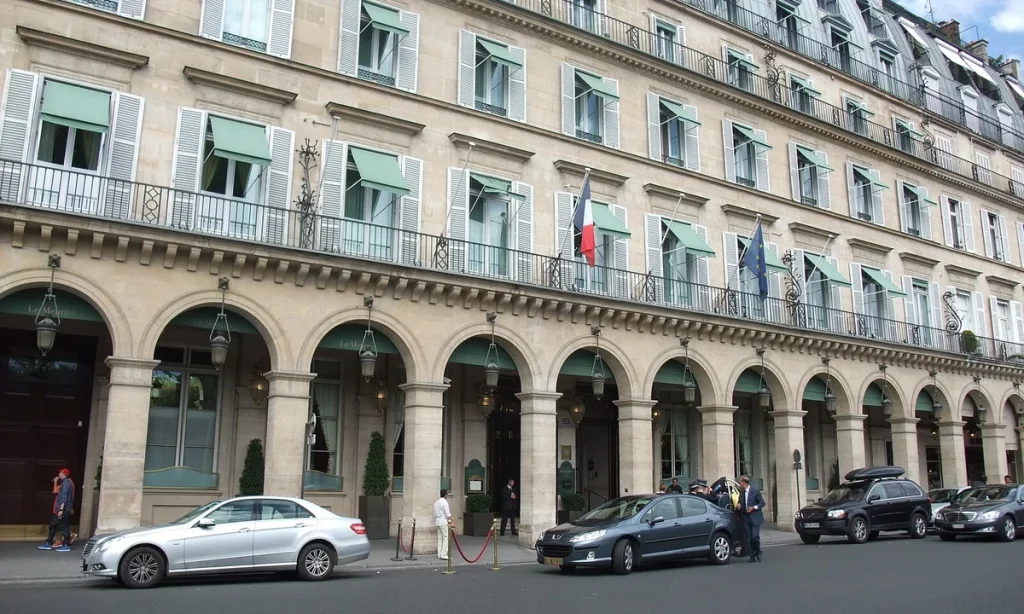The Salon Pompadour in Paris’s historic Le Meurice hotel, a short walk along the rue de Rivoli from the Musée du Louvre, is to be home to a gathering designed to bring change through culture. The event comes 107 years after Paris’s artistic beau monde gathered in the same room to celebrate the wedding of Pablo Picasso, the reality-altering enfant terrible of Modern art, to Olga Khokhlova, a principal dancer with Sergei Diaghilev’s defiantly avant garde Ballets Russes.
Two art world leaders have chosen the mirrored Louis Seize-style splendours of the Salon Pompadour at the Meurice—a hotel with a multi-layered art collection and art history, and from 1950 the Paris base of Salvador Dalí—for an event to be held during Art Basel Paris. On 23 October, Katherine Fleming, the president and chief executive of the J Paul Getty Trust, and Joseph Fowler, the head of arts and culture at the World Economic Forum (WEF), will jointly host invited guests for an evening featuring presentations by innovators working at the junction of art, technology and business.
According to the hotel, one of the paintings in the Salon Pompadour still bears the indent from a champagne cork popped during the Picasso wedding reception on 12 July 1918. The wedding party took place just over a year after Picasso made Cubist stage and costume designs for Parade (1917), the first of a succession of commissions from the Ballets Russes and Diaghilev, which culminated in Picasso’s monumental design for the curtain of Le Train Bleu (1924). The guests at the Meurice wedding party included the artist Max Jacob and two of Picasso’s fellow cultural change-makers: the polymathic Jean Cocteau, who had devised the scenario for Parade, and the poet Guillaume Apollinaire, who had written the programme notes for the same production.
This week’s event is the latest in a series of WEF Cultural Tables run by Fowler since 2023, some in London, New York and Paris. Others have been held at the WEF’s annual January meetings at Davos—where the world’s business and political élite engage in high-level encounters in the Swiss mountain retreat and where Fowler has developed a substantial and diverse arts and culture programme. Speakers at previous cultural tables have included the digital and media artists Refik Anadol, Benjamin Von Wong and Sougwen Chung.
The purpose of the WEF cultural tables, Fowler tells The Art Newspaper, is “to place culture at the heart of global change. What began as an idea has grown into a global movement … uniting leaders across art, policy, and enterprise in a format that is intentionally intimate, and radically human. I believe the cultural sector holds immense, still-untapped power to shape the systems-level transformation our world urgently demands”.
The Paris event is the first Cultural Table to be held in collaboration with the J Paul Getty Trust and the first event of its kind to be co-presented by Getty and the WEF. “It is a privilege to support a global platform for the work of visual artists, musicians, and other creatives, especially those whose work comments upon and incorporates new technologies,” Fleming tells The Art Newspaper.
“These innovators use their many talents to help us interpret economic, political, and cultural shifts, and are the leaders in defining a future path for the arts. At Getty, we are deeply committed to fostering cross-cultural dialogue and preserving cultural heritage, and we are proud to partner with initiatives like the Cultural Table that bring together diverse voices to shape a more connected and inclusive future.”
‘Culture at the heart of global change’: J Paul Getty Trust and World Economic Forum’s arts and culture body to hold joint Paris Art Week event
